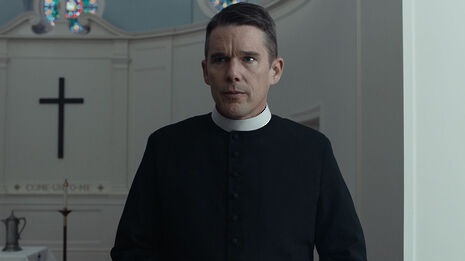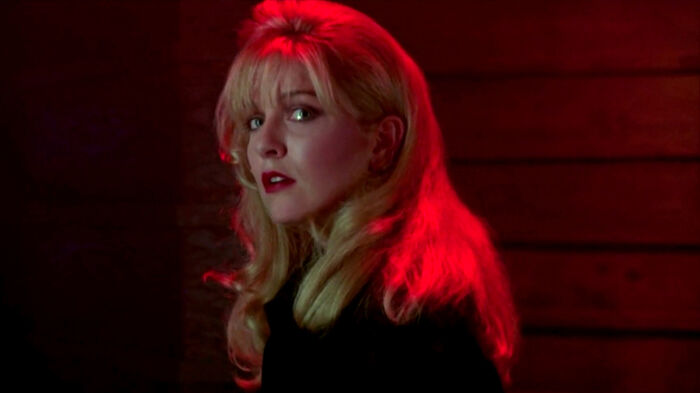Look on First Reformed, and despair
A few months on, Lillian Crawford examines this Oscar contender

It has been two months since I saw First Reformed. Its images are now a haze, blurred into pale hues at the back of my mind. And yet several haunting frames stand out clear as day, and force me to contemplate the very nature of existence. It is remarkable to think that director Paul Schrader made a film like The Canyons just four years before, a diabolical Lindsay Lohan soft porn ‘thriller’ penned by Bret Easton Ellis. There are congruities, of course: shots flicking back and forth between centrally-framed players that lend a hint of artifice to the dialogue. While before such awkwardness merely accentuated the flaws, here it brings coldness and distance to the fore. In the wake of our errors, and more so the errors of humanity, it can seem a godless earth.
If one commits oneself to saving the planet, one soon realises the overwhelming advantage corporate industry has over the little guys fighting for our future.
Ethan Hawke gives an understatedly gentle performance as Reverend Toller, a man in the grip of a most crippling crisis of faith. He is the custodian of the First Reformed Church in upstate New York, which now, as its name suggests, resembles more a tourist spot than a place of worship. On the rare occasion that it is housing the religious, they are pale and darkly dressed; Hawke’s melancholic delivery fails to inspire any of the frightened passion of American evangelicals we are so used to seeing. The starkness and near-desertion harken the end so bitterly that it hurts the soul, driving home a herald of fire and brimstone more real than any arm-flapping Southerner ever could.
First Reformed is thus teeming with dread. Toller nearly drinks himself to death as he comes to realise the fate of the earth, Hawke seemingly on the verge of tears for much of the runtime. No amount of preaching or prayer can change the course set for the world, as is laid plainly before him by local eco-warrior Michael Mansana (Philip Ettinger). If one commits oneself to saving the planet, one soon realises the overwhelming advantage that corporate industry has over the little guys fighting for our future. The loss of this war takes away Michael’s very purpose, and ultimately Toller comes to believe that his own path is no longer righteous.
There is no doubt that this is a deeply personal project for Schrader; it is, however, anything but closed off from the viewer. Even several rows back in an auditorium, the film looms over you with low angle shots that focus attention through the Academy ratio. One of the most striking props is a lamp shaped like an eye, placed incongruously next to a sofa on which Toller and Michael’s wife Mary discuss her husband’s mental conflicts. They watch each other, but the lamp indicates that the film is also staring at you, and knows that all of us must come to tackle environmental issues directly. It knows that you may well have thought of these matters before, but not quite like this.
Michael’s mission was not, for me, a hard sell. It has long been my understanding of the Christian faith that, as custodians of this planet, it is a duty of faith to care for it and all its creatures. It is impossible, however, to convince the majority of this view. Even on a non-religious level, there are times when explaining the morality of veganism to strangers or family can be frustrating – why one should have to justify one’s diet is in itself baffling. Not eating animals is for me as obvious as recycling or not burning fossil fuels, and yet such basic facts of prolonging our existence and fulfilling God’s plan continue to elude an overwhelming proportion of the population.
Toller undergoes a similar questioning as he scours the internet for information on rubbish dumps and toxic lakes. But as he does so, there arises a striking question that cuts through the core of the film – what if this is the plan of God? So prone to egoism and self-assigned arrogance, we assume an omniscience that we neither have nor deserve. In the finest scene of the film, Mary arrives at Toller’s barren home in the middle of the night and asks him to perform a ritual she used to do with her husband. She lies on the harsh wooden floor with the Reverend on top of her, and they synchronise their movements as they breathe together as one. The floor drops away and they soar into the infinite, with Schrader’s camera encircling their intertwined bodies. It is a most vivid depiction of blind faith, one that left me quivering as tears streamed down my dumbfounded face.
There are narrative similarities here with what must be Schrader’s most famous work, the screenplay for the Martin Scorsese-directed Taxi Driver. Travis Bickle (Robert de Niro) sees the “filth” of the earth as “all the animals [that] come out at night” – prostitutes, African-Americans, homosexuals, etc. For Toller, it is a more literal filth, that which has been wrought on nature by humanity and its ignorant wastefulness. Both beliefs lead to radicalisation, to the contemplation of acts of terror and murder that, it is hoped, will force people to change their perceptions and their behaviours. Neither man can commit such a crime, for both have an inherent goodness of conscience that, while Travis' is certainly more questionable, lead to an attempt at redemption.
Travis and Toller are likely the duality of Schrader’s own mind, with the latter perhaps the closer resemblance. First Reformed may then be viewed as his own quiet, understated act of protest. Having dabbled with the path to becoming a pastor himself, it seems he has found cinema to be his pulpit with this as his most accomplished sermon. Toller is told by Pastor Jeffers (Cedric Kyles) that “there’s no dollar sign on his pulpit, no American flag either”. The obvious lie in this claim is what has driven Schrader away, his loathing of the Church as a profiteering corporation and one of patriotic sensibilities. One cannot help but note the irony that it has led him to into the movie industry, but his message of hope for change will be spread further in the picture houses of the world than at the head of any single church.
 News / Cambridge academics sign open letter criticising research funding changes22 February 2026
News / Cambridge academics sign open letter criticising research funding changes22 February 2026 News / Supporters protest potential vet school closure22 February 2026
News / Supporters protest potential vet school closure22 February 2026 News / University Council rescinds University Centre membership20 February 2026
News / University Council rescinds University Centre membership20 February 2026 News / Hundreds of Cambridge academics demand vote on fate of vet course20 February 2026
News / Hundreds of Cambridge academics demand vote on fate of vet course20 February 2026 Comment / A tongue-in-cheek petition for gowned exams at Cambridge 21 February 2026
Comment / A tongue-in-cheek petition for gowned exams at Cambridge 21 February 2026









